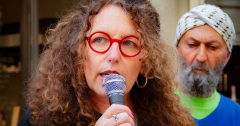On a cold December day during the Christmas holidays, Dalia Sarig’s 80-year-old father arrived at her home in Vienna after she had returned from a skiing trip.
He was there to pick up her stepsister, who had joined Sarig’s family on vacation.
She was convinced it would be her last meeting with her father, as their political differences were about to come to a head.
“I said goodbye. I hugged him,” she told Al Jazeera. “When I said goodbye, I said goodbye knowing that maybe I will not see him any more.”
Tensions with her Jewish family had been building for years. At 56, Sarig, a pro-Palestine activist, is at odds with most of her relatives.
Her parents adhere to Zionism, the nationalist political ideology that called for the creation of a Jewish state and is seen by Palestinians and their supporters as the system that underpins their suffering.
Sarig knew during that December meeting with her father that she intended to stage a pro-Palestine demonstration outside parliament in January that would be filmed by a local television station. The activist group she was a part of had put her forward for a broadcast interview. Appalled by Israel’s genocide against Palestinians in Gaza and determined to speak up, she went ahead with it.
“The interview was broadcast and it immediately went to my family.”
She later heard that her father, who also lives in the Austrian capital, had told friends that “to him, I died”.
“But he never talked about it with me, he never reached out to me to tell me something like this. [He] just cut the relation.”
Her 77-year-old mother, who lives in Germany, messaged her a week later.
“I still have it here in my phone, saying, you know, ‘I will not accept your political activism. You’re a traitor, you are dirtying the nest … and should you change your political views, we can return to normal. Stay healthy.’”
She has not spoken with her parents since.
Family divides are not uncommon among Jewish families from the United States to Israel, but have become more entrenched since October 7, 2023.
On that day, Hamas, the group that governs the Gaza Strip, led an incursion into southern Israel during which 1,139 people were killed and more than 200 were taken captive. Since then, Israeli bombardments have killed more than 61,700 people in the enclave.
“I think one of the most interesting phenomena among the liberal Zionists is the fact, while the majority moved to the right because of October 7, a minority became even more disenchanted with Israel and Zionism,” the author and academic Ilan Pappe, a prominent critic of Zionism, told Al Jazeera.
Sarig’s ancestors fled Austria in 1938, the year of annexation by Nazi Germany, for Serbia. They later settled in Palestine under the British Mandate in what is now present-day Israel. But by the 1950s, most of her relatives had returned to Austria, where she was born.
As a child, she celebrated Jewish holidays while learning about Zionism from elders.
She was also told that Palestinians “are the enemies, they want to kill all the Jews … that the Jews living there [in Israel] wanted peace, but the Arabs did not”.
At 18, she moved to Israel, where, at her parents’ encouragement, she joined a leftist Zionist youth movement.
Over 13 years in Israel, she joined a kibbutz, served in the Israeli army in an office role, and married. But it was as she studied politics and Middle East history at Haifa University that her worldview began to change.
That’s where she met a Palestinian professor and later became an activist for Palestinian rights.
“It began on a lawn in an evening together with my Palestinian teacher, when he told me the story of his family that was displaced from a small village.
“I understood that what I have been told, the Zionist narrative, is wrong,” she said. “I started to think how he might feel, how he’s feeling, or how I might feel as a Palestinian living in a Jewish state where my ancestors were expelled.”
Back in Austria, her family would argue with her at gatherings, agree never to speak again on Palestine and Israeli politics, break their promises, and clash once again.
In 2015, she renounced her Israeli citizenship as a gesture against Zionism.
“It makes my activism easier,” Sarig said, on being disowned by some of her family. “I lost my Jewish community because I was considered at best, strange and weird, and at worst, a traitor.”
But being cut off from one’s family can take a toll on mental health, say experts.
‘My outlook hasn’t significantly changed since October 7’
According to Faissal Sharif, a neuroscientist and doctoral student at the University of Oxford, brain imaging studies have shown that “the experience of social isolation triggers activity in are




